Baking soda has many uses around the house, and many people are surprised that it can also be used to care for pools. But what does baking soda do to a pool?
Baking soda is actually sodium bicarbonate, which is alkaline. So, adding it to a too acidic pool will raise the pH and total alkalinity. This will allow the chlorine in the pool to work more effectively to keep the water clean and clear.
Many people head to their local pool supply store and buy relatively expensive “pH or alkalinity increase,” believing it to be a specialist product. However, most tubs of this contain sodium bicarbonate – simple baking soda. So, if you can, buy some baking soda in bulk and save money.
This article will explore some of the benefits and drawbacks of using baking soda in a pool and the best time to add it for maximum benefit. Find out all this information and more below.
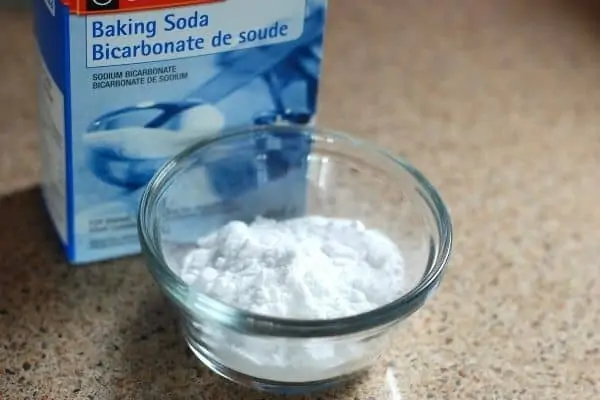

What does baking soda do in a pool?
Baking soda is generally used to neutralize a pool that is too acidic. This is because baking soda is alkaline, normally with a pH of around 8-8.3. So, it is not strongly alkaline—just slightly above neutral.
The benefits of baking soda to a pool are numerous and include:
- Helps to make chlorine more effective at sanitizing the pool’s water
- It can make the pool’s water feel softer
- If a pool’s water is cloudy, it can help to bring it back to being clear and sparkling.
- It can help with algae treatment
- Used to reduce the acidity, it reduces the risk of corrosion to things such as chrome pool ladders, pool surfaces and other pool equipment, which can take place when the water is more acidic
Will baking soda lower chlorine levels in the pool?
Some pool owners seem to believe that baking soda and chlorine together will make the chlorine less effective and, in fact, lower the chlorine level. However, using baking soda will not lower your pool’s chlorine level.
However, using it to ensure your pool has the correct pH level will help the chlorine work more effectively at sanitizing your pool’s water by killing bacteria and other contaminants.
When a pool’s pH level is low (i.e., acidic), the free chlorine in the pool’s water cannot work effectively.
How to keep a pool clean with baking soda
Below is the method I use when I want to add baking soda to my pool to raise the pH and total alkalinity levels.
1. Test the pool water
Test your pool water to determine its pH and total alkalinity levels using test strips or whichever method you prefer. If the pH is between 7.2 and 7.8 and the total alkalinity is above 80 ppm, you don’t need to add baking soda.
2. Work out how much baking soda to use
If your pool’s alkalinity is below 80 ppm, you need to decide the amount of baking soda to add to bring the reading up to the required level. Refer to the table below (remember to adjust for the volume of your pool).
So, for example, if your pool had 20,000 gallons and a reading of 60ppm, you would need to add 12 lbs (20,000/10,000 x 6lbs).
3. Run pool pump
You must ensure that the baking soda gets thoroughly mixed around your pool as you add it. The best way to do that is to run your pool pump until you are happy with your new test results. If I add quite a bit of baking soda, I normally add it in the evening and run the pool pump overnight.
4. Add baking soda (slowly)
This should be added in stages over a few days if you need to add a substantial amount. Anything over 3 lbs should not be added at once; otherwise, this can cause problems.
With your swimming pool pump running, you should add the baking soda by one of three methods:
- Fill a bucket with pool water and add about half a pound of baking soda. Mix this until at least most of it is dissolved, then walk around the edge of the pool, slowly pouring it as you go. Then, repeat as necessary. (This is my favored method.)
- Using a scoop, walk around the pool and scatter the baking soda on its surface.
- Slowly pour the baking soda directly into a skimmer to push it out of the pool jets and mix it with the pool water (this is my least favored method).
5. Test the water again and repeat if necessary
After you have given the baking soda sufficient time to mix thoroughly around the pool (at least an hour but preferably longer), retest the pool water again. If the pool’s pH level and total alkalinity levels are still too low, repeat the above.
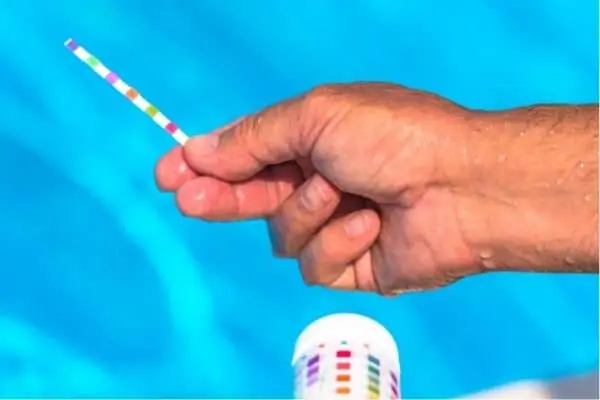
How much baking soda to raise the pH in the pool
| Alkalinity Reading | Baking soda to add per 10,000 gallons |
|---|---|
| 20ppm | 12lbs |
| 30ppm | 10.5lbs |
| 40ppm | 9lbs |
| 50ppm | 7.5lbs |
| 60ppm | 6lbs |
| 70ppm | 4.5lbs |
| 80ppm | 3lbs |
| 90ppm | 1.5lbs |
| 100ppm or above | Do not add any |
The table above will give you an idea of the number of pounds of baking soda to use to raise the alkalinity in your pool. You will need to know the volume of water in your pool – if you are not sure then it can be quite easy to calculate.
Your pool’s volume is something you will need to know for many things in pool maintenance so it is worth calculating now:
It is easy to calculate the volume of an oblong pool with a constant depth. Just multiply the width by the length and then by the depth (in feet) to give the cubic feet of water. Then, multiply this figure by 7.5 to give the volume in gallons.
If your oblong pool has a shallow and a deep end, use an average depth (perhaps midway between the two depths).
Round pools, oval pools, kidney pools and other shapes complicate the issue. Rather than turn this into a mathematics post, I suggest you look on your cell phone for an app that will help you calculate the volume of a pool. There are plenty to choose from.
Use our pool volume calculator:
Pool Volume Calculator
Please enter your pool shape and dimensions:
You should avoid adding a large amount of baking soda to your swimming pool water all at once, as this will probably result in cloudy water that will take a while to clear up.
Arm and Hammer Baking Soda – purchase on Amazon
How often should you put baking soda in your pool?
There is no hard and fast rule regarding how frequently you should use baking soda in your pool. Just use it as necessary to maintain the correct pH levels and pool water alkalinity levels after testing your pool’s water.
You will probably need to use it more frequently during peak swimming season when your pool is used most often and less frequently during the off-season.
Does baking soda raise pH?
Baking soda will raise the pH in a pool, assuming that the current pH of the water is lower than 8. However, it will also increase the total alkalinity, so you need to check these levels before you use it to ensure they are also low.
To raise the pH without increasing the total alkalinity, you would normally use soda ash (sodium carbonate) instead of baking soda as this has a much higher pH, so it will increase the pH without increasing the total alkalinity as quickly.
Best time of day to add baking soda to a pool
Frankly, it doesn’t matter what time of day (or night) you add baking soda to your pool. It will work just as easily if added in the morning or afternoon as it will in the evening.
I would only add it after the pool pump has been running for several hours to ensure that it is thoroughly mixed throughout the pool.
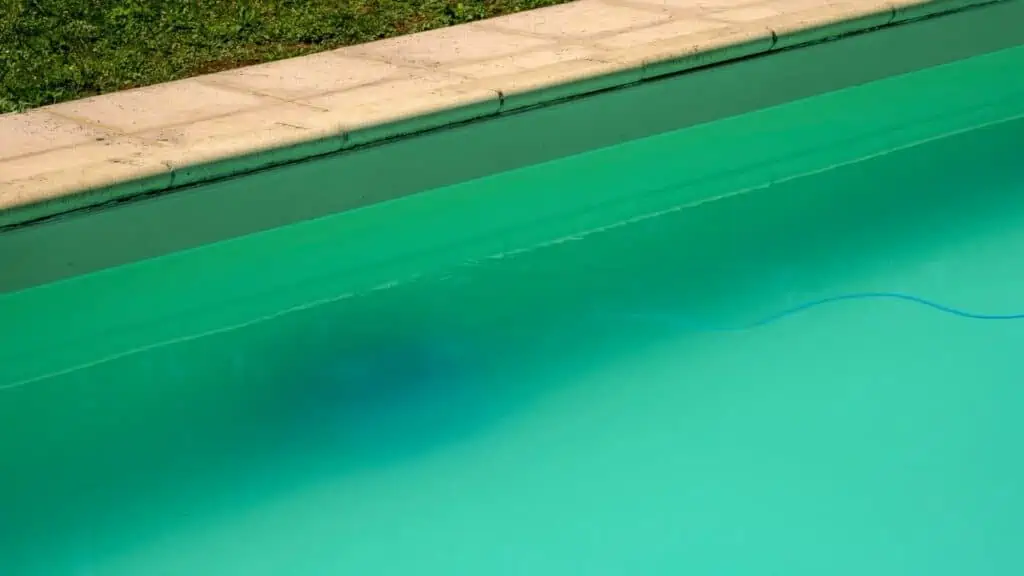
What if you add too much baking soda to the pool
If your pool water is hard, adding an excessive amount of baking soda can cause a build-up of calcium, which can lead to cloudy pool water and scaling around the edge of the pool and on other pool equipment. You will have to use a pool brush to remove it (actually make it dissolve in the water again rather than remove it).
Since baking soda’s pH is around 8.3 on the pH scale, it cannot raise the pool’s pH above this, no matter how much baking soda you add. As you add baking soda, the pH and alkalinity levels will increase until the pH reaches 8.3, after which alkalinity levels will continue to increase, but the pH will stay at 8.3.
As an aside, soda ash, the other chemical used to increase the pH in pool water, has a much higher pH of around 11.5. So, adding too much of this can significantly raise the pH.
FAQs
Is baking soda safe to use in pools?
Since baking soda is used in food and toothpaste, it can be generally considered safe. When adding it to a pool on a windy day, ensure it doesn’t blow in your face or eyes.
Will baking soda kill algae?
Baking soda will not actually kill algae. However, using it to maintain the correct pH in the pool will help prevent algae growth.
Can baking soda lower pH in a pool?
Although it isn’t a method that would be recommended (as there are better ways) if you had a very high pH (i.e., 9 or over), then, as the pH of baking soda is around 8, adding it would help reduce the pH to 8. It would be better if you were to add muriatic acid instead.
Can I use baking soda if my pool is cloudy?
If your swimming pool water is cloudy, you can use baking soda as part of the solution to clear the water. Getting the correct balance between pH and alkalinity before adding chlorine will help speed recovery from cloudy water.
Can you swim after adding baking soda to a pool?
Since baking soda is not a harmful chemical it would be safe to swim immediately after adding it to your pool, provided the other readings in your pool are ok.
Is Alkalinity Up the same as baking soda?
Alkalinity Up is 100% sodium bicarbonate, so it is exactly the same as baking soda.

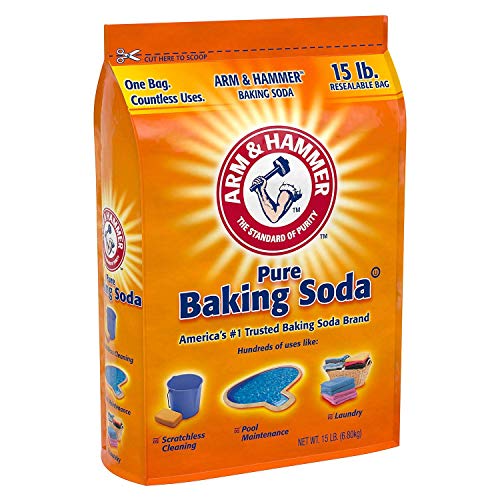

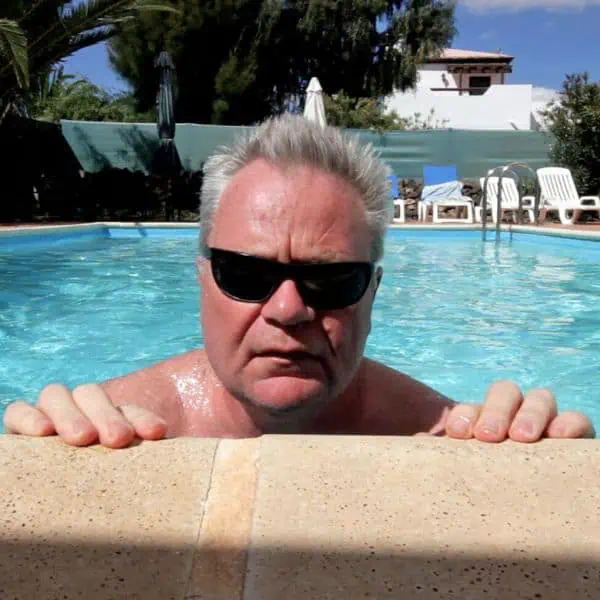


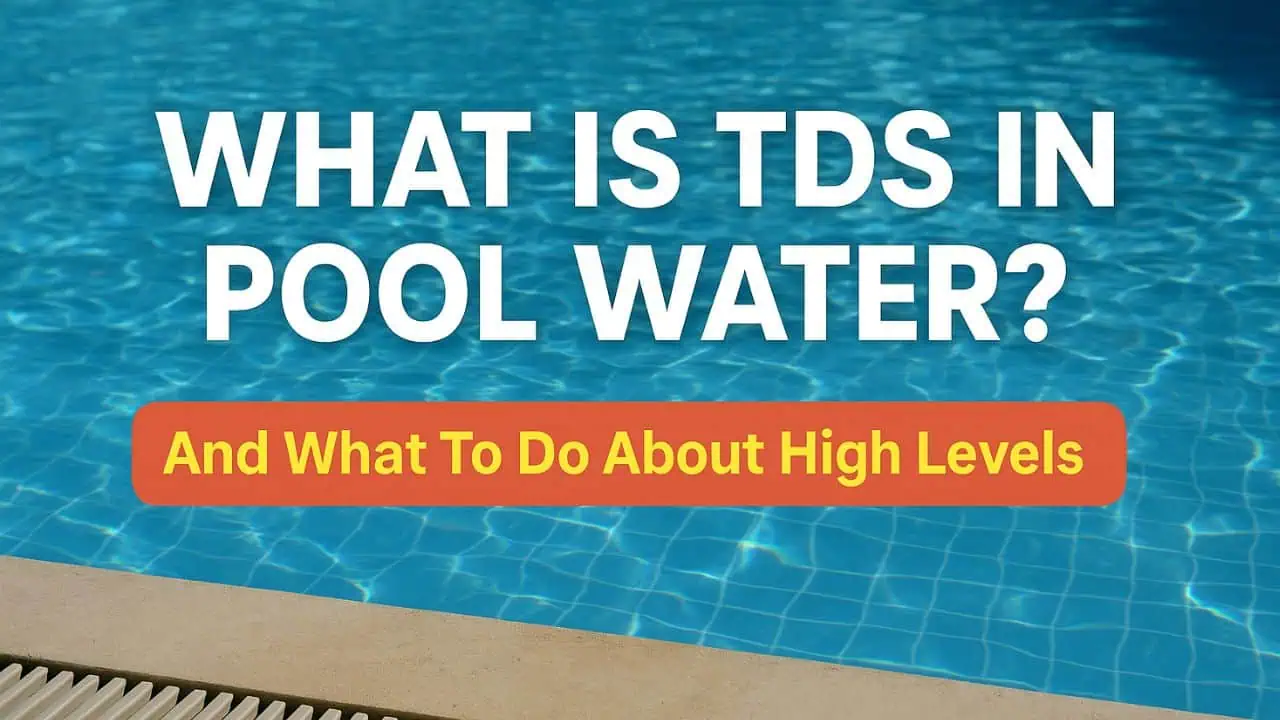
Leave a Reply